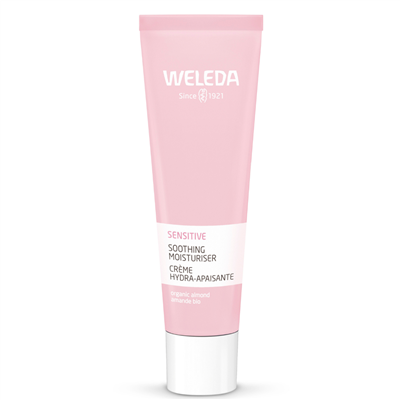.jpg)
What is dry skin?
Your skin feels thin, tight and stretched most of the time – maybe it’s flaky or cracked around your nails or knuckles. We’ve no need to tell you what having dry skin means, but Weleda can help you cope with it.Dry skin is thin and tight, perhaps with flakes, lines or cracks, or it looks ‘frosty’ or red, especially when you’re run down or when the weather is harsh. If it’s not looked after it can get sore and broken, even infected.
Learning to live with dry skin starts with a closer look at how the skin works. The skin forms the boundary between a human body, made of 60% water, and the 'dry' outside world, but because substances must be excreted through our skin. it cannot be a hermetically sealed layer. As a result, water vaporises into the air through the skin – but the skin has to ensure that natural moisture loss is reduced to a minimum. To protect our inner moisture, the epidermis is formed with a thick ‘cornified’ outer layer (stratum corneum), rich in fatty proteins in a close-knit structure which keeps moisture in and pathogens out. On top of it is the hydrolipid film, or acid mantle, which is made of oily secretions and sits on the surface of the skin.
With dry skin, the epidermis contains too much fat and holds too little moisture, which makes it dry and scaly. The acid mantle may also be too thin. Dry skin can be congenital (inherited or present from birth) but it can also be caused by a variety of external factors. It can occur anywhere on your body, from the scalp to the tips of your toes. Some people experience only patches of dry skin, for example only on the face, while others get it all over.
What are the causes of dry skin?
- Shower or bath products The combination of soaps, bath and shower gels with aggressive detergents and very hot water not only removes dirt, but can also affect the acid mantle of our skin. After coming out of the shower, water evaporates from the skin. Frequent showering or bathing with hot water and chemical products is likely to exacerbate your dry skin.
- The use of certain cosmetics Synthetic emollients (moisturisers) can also affect acid mantle of your skin, as can some perfume substances and preservatives. With the barrier function unable to function properly, more moisture is lost and an even drier skin can result.
- Diet and lifestyle A shortage of certain nutrients such as protein and certain fats can mean that your skin cells show a shortage of these substances. An unbalanced diet is one of the causes of dry skin, especially if you also drink a lot of alcohol and/or smoke. You are literally drying out your skin from the inside.
- Your age As you get older, hormone changes mean your skin becomes drier. It’s a natural process which we often start to notice most during and after menopause. That’s when oestrogen decreases and many women notice that their skin feels much drier.
- Harsh weather In cold temperatures, wind and dry air, your skin will get dried out even more from the outside. During the winter you can feel your skin suffering.
- Exposure to sunlight Too much sunlight can dry the skin – although some sunlight is important for the production of vitamin D, which is lacking in much of the UK population. Try not to over-indulge in the sun when the weather does turn fine, or when you are on holiday.
- Dry air in the house Ideal humidity in the house is around 45 to 50%, but with central heating and air conditioning it’s often much lower, and dry skin once again suffers. A humidifier or bowls of water on a windowsill or above the radiators may solve the problem.
- Stress Research shows that stress not only interferes with the functions of the skin, but also has an influence on the production of the proteins which help to retain moisture.
- Sensitive skin With a sensitive skin your body's defense mechanism is disturbed by external stimuli. Dry and sensitive skin often go together.
- Heredity Dry skin can be genetically determined, which is usually evident soon after birth. Often the parents are already familiar with their own dry skin, so that from the very first years of life they can choose appropriate care for their child.
What to do about dry skin?
With all these factors potentially causing, or affecting your dry skin, it’s very soon obvious that care of dry skin involves much more than just slathering on some moisturising cream. We have a few helpful tips that you may find help you make quite a difference to your skin comfort, but if you suffer from extremely dry skin that tends to eczema or psoriasis, we recommend that you consult a dermatologist.
These are our five tips for caring for dry skin:
- Find the cause Does your skin react more strongly than usual to external stimuli, such as synthetic ingredients in detergents or cosmetics? Do you notice redness, rash or itching, especially after washing? If you can identify a cause – such as a detergent, cosmetic product or fabric, eliminate it for six weeks and see if your skin comes back into balance.
- Customise your shower or bath regime Frequent showering or bathing with hot water dries your skin out. Set the temperature of your shower at maximum 37 degrees and try to keep contact with the water as short as possible. Use natural, mild shower creams containing detergents based on sugar and coconut, which don’t attack the protective layer of your skin. Indulge your skin after showering with a natural body lotion or body oil.
- Choose customised facial care The skin of your face needs extra attention, especially if it is dry. Opt for mild, natural, care products with moisturising and nourishing plant oils. In this way, the skin gets the nutrition it needs, but does not become charged with potentially irritating substances, such as synthetic perfumes and preservatives.
- Nourish your skin from the inside Drink up to two litres of water daily and eat plenty of protein and healthy fats. Rich in helpful omega-3 fatty acids are beans, eggs, salmon, sardines and mackerel. Try and get enough relaxation, exercise and sleep. And give up smoking! That does wonders for your skin.
- Protect yourself against bad weather In cold or wild winter weather give additional protection to the face, lips and hands. Hats, scarves and gloves should be supplemented by a natural lip balm, weather protection cream and hand cream.
Weleda has great products for dry skin, which tick all the right skincare boxes. All of our Creamy Body Washes are made with sugar and coconut based surfactants which don’t strip your skin, and our Almond Sensitive Body Care range is especially gentle if your skin is sensitive. Our body lotions are super-caring for all-over skin, and designed to blend in your hand with our body oils if you want to enrish them even further. For hands and facial care, we have handcreams, moisturisers and cleansers made with natural seed and plant oils, gently fragranced with essential oils. And don’t forget Weleda’s skincare heroes – including our wonder balm Skin Food – created in 1926 and still the best friend of beautiful and hard-working women. Browse our website and find the range and products that love your skin – your skin will love you right back!


